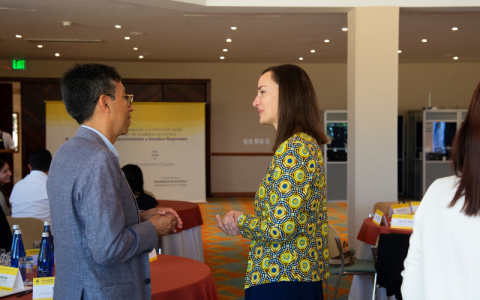CSGD engages with policymakers in Latin America

Latin America is well-known for its extensive social protection programmes, supporting poor and vulnerable populations with cash transfers and other initiatives. While these have protected families from poverty and resulted in positive outcomes for children, existing programmes have been less successful in promoting economic resilience.
The Centre for the Study of Global Development’s (CSGD) Co-Deputy Director and Poverty and Social Protection (PSP) Hub Co-Lead – Dr Keetie Roelen, delivered the keynote on cost-effective social protection initiatives at the ‘From Protection to Social Promotion, Creating Economic Citizenship: Opportunities and Challenges’ event in Santa Marta, Colombia, on 22 and 23 February 2024.
This event was organised by NGO Fundación Capital to exchange lessons learned, evidence and practical experiences in the implementation of government-led economic inclusion programmes, which are transforming social policies in the region.
Around 40 government representatives from across Latin America, including ministers of social development and inclusion from Ecuador and Paraguay, vice-ministers from Peru and Paraguay, and directors of welfare departments from Brazil, Mexico and the Dominican Republic, attended the event to discuss the development and reshaping of social protection policies. These policies can improve economic empowerment and financial health, which will ultimately benefit millions of people across the region.
Dr Roelen shared global evidence on the shift towards comprehensive programming in social protection, showing that schemes that combine economic support with additional training, coaching and support can be more effective. She also presented preliminary findings from a review of studies in Latin America led by PSP Hub Co-Lead Dr Thaís de Carvalho, highlighting the region’s wealth of experience in social protection, especially conditional cash transfers.
While evidence points towards their impact on many elements of family well-being, their effect on economic activities is limited. Gender dynamics play an important role as programmes mainly target women, but the burden of paid and unpaid work and limited connections to the labour market make it more difficult to be economically empowered.
Participants shared how their countries try to combine and coordinate programmes that provide cash transfers and economic inclusion interventions, all in a bid to best support large, vulnerable populations with a limited government budget.
CSGD’s next steps, led by Dr Thais de Carvalho, include the finalisation of the review of literature in Latin America, which is to be published as a CSGD Research and Evidence Paper, and follow-up with key stakeholders in Brazil for the Open Societal Challenges project - Examining the role of climate vulnerability in intergenerational poverty in Amazonia: building sustainable futures for Indigenous youth from the ground-up.
Are you already an OU student?
Request your prospectus
Explore our qualifications and courses by requesting one of our prospectuses today.
Request prospectus